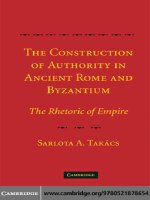0521858461 cambridge university press the limits of leviathan contract theory and the enforcement of international law aug 2006
Bạn đang xem bản rút gọn của tài liệu. Xem và tải ngay bản đầy đủ của tài liệu tại đây (1.76 MB, 265 trang )
This page intentionally left blank
The Limits of Leviathan
Much of international law, like much of contract, is enforced not by independent
sanctions but rather through cooperative interaction among the parties, with repeat
dealings, reputation, and a preference for reciprocity doing most of the enforcement
work. The Limits of Leviathan identifies the areas in international law where formal
enforcement provides the most promising means of promoting cooperation and
where it does not. In particular, it looks at the International Criminal Court,
the rules for world trade, efforts to enlist domestic courts to enforce orders of
the International Court of Justice, domestic judicial enforcement of the Geneva
Convention, the domain of international commercial agreements, and the question
of odious debt incurred by sovereigns. This book explains how international law,
like contract, depends largely on the willingness of responsible parties to make
commitments.
Robert E. Scott is a nationally recognized scholar and teacher in the fields of contracts, commercial transactions, and bankruptcy. He was the inaugural Lewis F.
Powell Jr. Professor of Law at the University of Virginia School of Law from 1982 to
2003 and William L. Matheson & Robert M. Morgenthau Distinguished Professor
from 2001 to 2003. In 2003 he was named an inaugural recipient of the David and
Mary Harrison Distinguished Professorship. He has delivered numerous papers and
published extensively in law journals. He has coauthored four books on contracts
and commercial transactions. Among his many articles are six that he coauthored
with Professor Charles Goetz that set the standard for the economic analysis of the
law of contracts.
Paul B. Stephan is an expert on international business and Soviet and post-Soviet
legal systems who has spent his career studying and writing about the globalization
of the world economy and the transition away from Soviet-style socialism. He
joined the Virginia faculty in 1979 and was the Percy Brown Jr. Professor of Law
from 1991 to 2003. In 2003, he succeeded Scott as the Lewis F. Powell Jr. Professor of
Law. He has written extensively on international law, corruption, and the history
of the Cold War, as well as on taxation and constitutional law. He has worked in
Russia, Georgia, Ukraine, Albania, and Slovakia on behalf of the U.S. Treasury and
in Kazakhstan and Azerbaijan on behalf of the International Monetary Fund.
THE LIMITS OF LEVIATHAN
Contract Theory and the Enforcement of
International Law
ROBERT E. SCOTT
David and Mary Harrison Distinguished Professor of Law, University of Virginia
PAUL B. STEPHAN
Lewis F. Powell Jr. Professor of Law and Hunton & Williams Research Professor,
University of Virginia
cambridge university press
Cambridge, New York, Melbourne, Madrid, Cape Town, Singapore, São Paulo
Cambridge University Press
The Edinburgh Building, Cambridge cb2 2ru, UK
Published in the United States of America by Cambridge University Press, New York
www.cambridge.org
Information on this title: www.cambridge.org/9780521858465
© Robert E. Scott and Paul B. Stephan 2006
This publication is in copyright. Subject to statutory exception and to the provision of
relevant collective licensing agreements, no reproduction of any part may take place
without the written permission of Cambridge University Press.
First published in print format 2006
isbn-13
isbn-10
978-0-511-24946-4 eBook (EBL)
0-511-24946-2 eBook (EBL)
isbn-13
isbn-10
978-0-521-85846-5 hardback
0-521-85846-1 hardback
Cambridge University Press has no responsibility for the persistence or accuracy of urls
for external or third-party internet websites referred to in this publication, and does not
guarantee that any content on such websites is, or will remain, accurate or appropriate.
CONTENTS
Foreword
page vii
1
Introduction . . . . . . . . . . . . . . . . . . . . . . . . . . . . . . . . . . . . . . 1
2
States, Firms, and the Enforcement of International Law . . . . . . . . . 29
3
Lessons from Contract Theory . . . . . . . . . . . . . . . . . . . . . . . . . . 59
4
A Model of Optimal Enforcement . . . . . . . . . . . . . . . . . . . . . . . . 84
5
Patterns of International Law Enforcement . . . . . . . . . . . . . . . . . 110
6
The Choice between Formal and Informal Enforcement . . . . . . . . 147
7
The Future of International Law and Its Enforcement . . . . . . . . . . 180
Glossary
215
Table of Authorities
225
Index
247
v
FOREWORD
This book has its origins in work we presented at a conference on Freedom From
Contract, organized by Omri Ben-Shahar of the University of Michigan and
hosted by the University of Wisconsin Law School. That conference reinforced
two impressions that had motivated our collaboration: Contracts scholars and
international lawyers have not made much of an investment in learning what
each field has to offer the other, and the possibilities for mutual enrichment
are great. This extension of that project represents our effort to demonstrate
both that problems in international relations illuminate some of the most
challenging issues in contract theory today, and that international law takes on
great theoretical richness and rigor when it employs the insights of contract
theory.
For the most part, our theoretical claims in this book are positive and descriptive rather than normative. We believe that contract theory (an umbrella phrase
that we use to describe both the law and economics of contracts as well as the
separate discipline of the economics of contract) explains much of current practice regarding the enforcement of international law. Seeking to understand why
we see the legal institutions we do, as opposed to describing and defending a
better world in which we might live, is more familiar to contracts scholars than
to international lawyers. One of the exciting challenges of international law
and international relations theory, however, is to give a convincing account of
the world as we find it, and for this purpose contract theory does important
work. We will be happy if this book challenges both contracts scholars and
international lawyers to rethink what their disciplines do.
We could not leave the subject, however, without showing some of the normative implications that contract theory has for current controversies in international law and its enforcement. The final chapter of this book considers
some of these questions. We recognize that not everyone will appreciate the
vii
viii
Foreword
normative implications of our theory and that some will resist them. We welcome the challenge of this criticism, as our primary purpose is to open a
conversation. Where this leads us is less important than that we start down the
path.
We recognize that an attempt to marry widely divergent scholarly traditions, with distinct methodological approaches and normative commitments,
presents great obstacles. We have learned from our collaboration that scholars
in one field tend to regard those in the other as speaking a separate language.
One modest contribution that we make toward overcoming these barriers is
the glossary at the back of the book, which is meant to help the reader negotiate through the terminological hurdles that interdisciplinary work necessarily
erects. More generally, we believe that this book demonstrates how scholars
from different traditions can craft a joint research agenda of general interest.
Our paper for the Freedom From Contract conference and the subsequent
book manuscript has received careful comments from many colleagues. We
benefited from comments of the conference participants, in addition to insights
derived from workshops at the University of Chicago Law School, Georgetown University Law Center, Case Western Reserve Law School, Vanderbilt
Law School, Washington and Lee Law School, and the University of Virginia
School of Law. In addition, a number of colleagues have shared with us both
their criticism and wisdom. Jody Kraus and Ted White in particular gave valuable guidance at a time when we were considering what this book should look
like. Other attentive and helpful readers included Karen Alter, George Bermann,
Curtis Bradley, Rachel Brewster, Jack Goldsmith, Andrew Guzman, Julian Ku,
Allen Lynch, John Setear, Dan Tarullo, Joel Trachtman, George Triantis, John
Yoo, and four anonymous referees. The staff of the Arthur J. Morris Law Library
at the University of Virginia, and in particular Xinh Luu, were always at our
beck and call and never let us down. Jeremy Weinberg provided invaluable
research assistance, and Aaron Mahler displayed great skill as an editor. Our
Dean, dear friend and colleague John C. Jeffries Jr., ensured that we never lacked
for support. John Berger persuaded us to undertake this project, and we remain
in his debt. Laura Lawrie was an excellent copy editor. Last, but far from least,
Pamela Clark and Elizabeth Scott gave us the right mix of uncritical acceptance
and coruscating insight.
1 INTRODUCTION
If a covenant be made, wherein neither of the parties perform presently, but trust one
another; in the condition of mere nature, which is a condition of war of every man
against every man, upon any reasonable suspicion, it is void: but if there be a common
power set over them both, with right and force sufficient to compel performance, it is
not void. For he that performeth first, has no assurance the other will perform after;
because the bonds of words are too weak to bridle men’s ambition, avarice, anger, and
other passions, without the fear of some coercive power.
Thomas Hobbes, Leviathan (1651)
We are determined to work at all levels to tackle global terrorism and stem the weapons
of mass destruction. To this end, we will promote relentlessly the dialogue among
civilizations and contribute uncompromisingly to strengthening the institutions of
global governance and expanding the reach of international law.
Athens Declaration on the Signing of the Treaty of Accession on the Enlargement
of the European Union, April 16, 2003
R
ecently, a canadian company and its principal stockholder
put the civil justice system of the United States on trial. Outraged by a
huge punitive damages award that drove the company into bankruptcy, they
claimed that a Mississippi lawsuit violated their fundamental rights. Remarkably, the victims based their suit on international law, and brought it before
an international tribunal empowered to issue a monetary award against the
United States. 1
1
The Loewen Group, Inc. v. United States, Final Award (Jun. 26, 2003) (egregious misconduct in
civil trial leading to enormous damages manifestly a denial of justice subject to Chapter 11; no
relief available because victim failed to seek appellate review). The United States is a party to the
Convention on the Settlement of Investment Disputes Between States and Nationals of Other States,
Mar. 18, 1965, art. 52, 17 U.S.T. 1270, 575 U.N.T.S. 159 (1985), which obligates it to respect the awards
1
2
Limits of Leviathan
In Europe, vindicating rights derived from international law through an
international tribunal is nothing new, as the language of the Athens Declaration quoted earlier suggests. Anyone who believes someone has infringed an
interest protected by the European Community’s Treaty of Rome, to which
twenty-five states now adhere, can both demand that domestic courts hear the
claim and obtain review of these decisions in the European Court of Justice
in Luxembourg. Using these tools, women in Northern Ireland have forced
the British government to hire them as police officers; foreign beer producers
have overturned Germany’s restrictions on their sales; and professional soccer
players have obtained free agency.2 A victim of human rights violations by any
of forty-five European states can sue in the European Court of Human Rights,
based in Strasbourg, and obtain both a determination of the rights in question
and a damages award. In recent years, the Strasbourg court has confronted
issues that, in the U.S. context, provoke great passion. It has, for example, vindicated the right to die, forbidden discrimination against the transgendered,
and mandated the inclusion of homosexuals in the armed forces.3 Many European states also authorize their domestic courts to enforce the same body of
human rights law. The statute empowering British courts to do so functions
something like a Bill of Rights, the first in British history.
In the United States, the Supreme Court in Sosa v. Alvarez-Machain recently
endorsed the idea that federal courts can entertain suits under international law,
even in the absence of a treaty or statute explicitly authorizing the litigation.4
For nearly a quarter-century in advance of this decision, some lower courts had
been doing this. Federal litigation based on international law has challenged
the employment policies, environmental records, and mining and drilling
2
3
4
of these tribunals. See 22 U.S.C. §§1650, 1650a (2001). Cf. 28 U.S.C. §2414 (2001) (obligating Secretary
of Treasury to pay awarded after confirmation by federal court pursuant to 22 U.S.C. §1650a). For
a general discussion, see Guillermo Aguilar Alvarez & William W. Park, The New Face of Investment
Arbitration: NAFTA Chapter 11, 28 Yale J. Int’l L. 365 (2003).
Union Royale Belges des Soci´et´es de Football Association v. Bosman (Case C-415/93), [1995] E.C.R.-I
4921 (soccer free agency); Commission v. Germany (Case 178/84), [1987] E.C.R. 1227 (beer purity
standards); Johnston v. Chief Constable (Case 222/84), [1986] E.C.R. 1651 (sex discrimination).
For representative cases, see Lopez Ostra v. Spain, 20 Eur. H.R. Rep. 277 (1994) (solid waste treatment
plant located near home violates right to privacy); Maria Guerra v. Italy, 26 Eur. H.R. Rep. 357 (1998)
(serious environmental pollution violates right to privacy); Jordan v. United Kingdom, 37 Eur. H.R.
Rep. (2001) (deficiencies in police investigation of homicide constitute a violation of European
Convention’s right to life); Pretty v. United Kingdom, 35 Eur. H.R. Rep. 1 (2002) (right to die); I. v.
United Kingdom, 36 Eur. H.R. Rep. 53 (2002) (failure to give legal recognition to sex change violates
right to privacy); E. v. United Kingdom, 36 Eur. H.R. Rep. 31 (2002) (failure by social services to
exercise due diligence in supervising children endangered by home environment violates European
Convention).
542 U.S. 692 (2004) (dismissing claim that arbitrary arrest of Mexican national by Mexican police
constituted a violation of international law for which a damages remedy was available).
Introduction
3
practices of a host of prominent multinational firms.5 A recent spate of litigation
has asserted the obligation of U.S. courts to obey a decision of the International
Court of Justice regarding the rights of aliens arrested in the United States, a
position that a majority of the Supreme Court did not reject and that four
justices seemed to embrace.6 Legislation in the United Kingdom, Canada, and
other large and important jurisdictions has opened up domestic courts to
claims based on international law. Finally, in Roper v. Simmons the Supreme
Court, hesitantly and controversially, seems to have embraced international
law as a tool for interpreting the more elastic clauses of the Constitution.7
What these phenomena embody is a new approach to the enforcement of
international law. Traditionally, states contracted for obligations, which they
undertook to enforce through methods ranging from diplomatic protests to
economic pressure to armed attack. Informal sanctions, largely involving effects
on reputation and threats of retaliation, did most of the day-to-day work of
ensuring compliance. International law was soft, in the sense that there existed
no Hobbesian Leviathan to sanction default. The new approach, in contrast,
allows private enforcement, employs independent tribunals and courts to do
the enforcing, and empowers those tribunals and courts to wield the same
array of tools that domestic courts traditionally use to compel compliance with
their decisions. International law has become hard law, with its own Leviathan.
5
6
7
For a representative sample of the cases, see Aldana v. Del Monte Fresh Produce, N.A., Inc., 416 F. 3rd
1242 (11 th Cir. 2005) (lawsuit by Guatemalan trade unionists against plantation owner for physical
abuse); Alperin v. Vatican Bank 410 F.3d 532 (9th Cir. 2005) (lawsuit against bank for assisting in
human rights violations during World War II); Ungaro-Benages v. Dresdner Bank AG, 379 F.3rd
1227 (11 th Cir. 2004) (lawsuit against banks for assisting Nazi takeover of Jewish-owned companies);
Flores v. Southern Peru Copper Corp., 343 F.3rd 140 (2nd Cir. 2003) (lawsuit against mining company
for pollution-related injuries); Doe v. Unocal, 395 F.3rd 932 (9th Cir. 2002) (lawsuit against energy
company for slave labor compelled by local military on behalf of company); Aguinda v. Texaco, Inc.,
303 F.3rd 470 (2nd Cir. 2002) (lawsuit against energy company for environmental damage); Bano v.
Union Carbide Corp., 273 F.3rd 370 (2nd Cir. 2001) (lawsuit against chemical company for release
of toxic gas); Bigio v. Coca-Cola Co., 239 F.3rd 440 (2nd Cir. 2000) (lawsuit against companies that
rented or purchased property that had been seized by Egypt from Jewish owners); Wiwa v. Royal
Dutch Shell Corp., 226 F.3rd 88 (2nd Cir. 2000) (lawsuit against energy company for complicity
in suppression of critics of its relations with Nigerian government); Beanal v. Freeport-McMoran,
Inc., 197 F.3rd 161 (5th Cir. 1999) (lawsuit against mining company for environmental abuses and
genocide); Hamid v. Price Waterhouse, 51 F.3rd 1411 (9th Cir. 1995) (lawsuit by depositors in collapsed
bank against business associates of bank). According to press reports, the Unocal lawsuit resulted in
a substantial settlement in 2004, after the Supreme Court decided Sosa, although the amount of the
defendant’s payment remains undisclosed.
Medellin v. Dretke, 544 U.S. 660 (2005) (dismissing lawsuit in light of presidential order seeking to
implement ICJ decision); id. at 672 (O’Connor, J., dissenting) (asserting jurisdiction to hear suit).
543 U.S. 551 (2005). The Supreme Court currently has before it a joined case that might allow it
to address these issues yet again. Sanchez-Llamas v. Oregon, No. 04-10566, and Bustillo v. Johnson,
No. 05-51, argued March 29, 2006. One of us (Stephan) filed a brief amicus curiae in support of the
respondents in those cases.
4
Limits of Leviathan
In the case of the dispute over civil justice in Mississippi, for example, the
tribunal had the authority to issue an award of damages against the United
States, which U.S. law required the government to honor.
Throughout this book, we will use the term formal enforcement to distinguish legalized, institutionally based, privately initiated mechanisms from the
traditional informal means of enforcement that remain subject to state control.
The key characteristics of the formal enforcement process are the promulgation
of nondiscretionary rules governing the behavior of affected parties and the
existence of a body with both the authority and the capacity to consider claims
brought by a representative range of interested parties and to grant relief
through direct imposition of preannounced and salient sanctions for noncompliance. When we say “a representative range of interested parties,” we do
not mean that standing to initiate proceedings has to extend to all interested
persons, but only that it is not limited solely to states. When we talk about
“direct imposition” of sanctions, we mean to exclude cases where a body can
only call on states to carry out its judgment. Throughout, our focus is on the
formality of enforcement and not the formality of dispute resolution. International law has many tribunals with the capacity to hear complaints and deliver
pronouncements. We are concerned with the limited (but growing) number of
cases in which a disinterested dispute resolver (not necessarily exercising state
power) has the capability directly to impose costs on rule breakers.
Formal enforcement, in sum, is more than a centralized system of dispute
resolution: It entails independent authority by a legal body to take up a matter and the capacity directly to impose meaningful sanctions. As we explain
more fully in this book, our concept of formal enforcement embraces private
commercial arbitration and a private group’s centralized enforcement of its
membership rules as well as state-created adjudicative bodies. The key distinction is not between private and public adjudication but between, on the
one hand, ex ante legalization with centralized enforcement and, on the other
hand, informal sanctions for noncompliance imposed ex post without much
coordination.
A long-standing conversation among international legal scholars involves
the distinction between hard and soft law. Hard law creates a clear obligation,
although these scholars rarely specify what kinds of enforcement mechanisms
are entailed. The model, however, is domestic law, which courts enforce with
a variety of sanctions at their direct disposal. Soft law expresses hopes rather
than commitment, and by its terms entails no direct enforcement. Without
taking sides in the debate about the definition and significance of hard and
soft law, we will appropriate the term for our discussion of enforcement. We
regard international law that is enforced formally to be hard law, and the
Introduction
5
growth of formal enforcement constitutes a hardening of international law.
We recognize that for some specialists the hard/soft distinction refers only to
the content of an obligation, and not the enforcement mechanisms attached
to it.8 We are persuaded, however, that a functional analysis of any set of legal
rules, international law most of all, must give a central role to enforcement
mechanisms.
Elements of our argument challenge conventional understandings about the
enforcement of international law. First, the significance of formal enforcement
of international law by independent courts and tribunals remains controversial. Mainstream international law scholars mostly see international law as, at
best, weakly enforced, and discount the power and influence of the enforcement institutions that do exist.9 A widespread, and in our view erroneous,
belief holds that international law enjoys no formal enforcement. Accordingly,
many scholars bemoan the ability of individual states, first and foremost the
United States, to frustrate the enforcement of international law and call for
strengthening existing formal mechanisms and adding new ones. In particular,
those who aspire to more hardening of international law dominate the legal
academy.
A dissident strain of scholarship argues that the already existing institutions represent an intolerable threat to national sovereignty. Critics on the left
attack the tribunals that enforce investment protection treaties as illegitimate
impediments to necessary national environmental, labor, cultural, and social
regulation. Critics on the right complain that the International Criminal Court,
the European economic and human rights courts, and the increasing willingness of domestic courts to fashion rights and remedies based on international
law all represent a threat to liberty and democratic self-governance.
Both the mainstream scholarship and the dissident strands miss crucial
points. The mainstream scholars do not appreciate how much formal enforcement already exists in the international system and how it has become more
significant in recent years. Its expansion undermines concerns about its weakness: The trend is clearly away from impotence. International law, because
of the growth of formal enforcement, has become a real force with direct and
material consequences for a wide range of actors. The institution may not wield
8
9
Kenneth W. Abbott & Duncan Snidal, Hard and Soft Law in International Governance in Legalization and World Politics 37 (Judith L. Goldstein, Miles Kahler, Robert O. Keohane, & Anne-Marie
Slaughter, eds. 2001). For a recent discussion of these concepts that proposes to substitute “legal”
and “nonlegal” for “hard” and “soft,” see Jack L. Goldsmith & Eric A. Posner, The Limits of
International Law 81 –100 (2005).
For recent instances, see Anupam Chander, Globalization and Distrust, 114 Yale L.J. 1193 (2005);
Allison Marston Danner, Enhancing the Legitimacy and Accountability of Prosecutorial Discretion at
the International Criminal Court, 97 Am. J. Int’l L. 510 (2003).
Limits of Leviathan
6
the full extent of power associated with Hobbes’s Leviathan, but its capabilities
are considerable and growing.
The dissidents, in contrast, do not overstate the extent of formal enforcement
so much as draw the wrong inferences about what it does. It is not plausible
that a phenomenon of sufficient breadth to alarm both the left and the right
results from a covert and illegitimate usurpation of national sovereignty. Formal
enforcement has grown because it bolsters otherwise valuable cooperation, not
because it represents a power grab by unaccountable actors.
Methodology
This book draws on several scholarly discourses in the course of establishing
its claims. We recognize that the switching among fields required by interdisciplinary work makes demands on our readers, but we try to lighten that
burden by providing sufficient background for each. We of course address
international lawyers, both scholars and other policy makers, who continue to
search for ways of grounding their discipline in robust theory and convincing
empirical analysis.10 We hope to persuade them that modern contract theory
provides an important new perspective for understanding both what international law does and what society should ask it to do. We also draw heavily on
the work of political scientists who specialize in international relations and
seek to extend their insights. Our core methodological commitment, however,
remains with law and economics, the discipline that has most influenced contract theory over the last three decades. Our underlying purpose is to convince
international lawyers and international relations experts of the value of this
methodology as a tool for understanding their fields.
A related goal is to normalize international law scholarship. In spite of the rise
of formal enforcement and the consequent intrusion of international law claims
into a growing number of domestic public policy debates, international law
specialists tend not to engage much with other members of the legal academy.
Some of the traditional barriers between the discipline and other approaches
to law have begun to come down, partly as a result of a growing collaboration
between international lawyers and political scientists, partly because the public
policy issues have attracted the interest of leading public law scholars, and partly
10
When we speak of “other” policy makers, we mean to suggest that, for international lawyers,
scholars count as policy makers. For insiders to international law, the term “publicist” does this
work. It refers to persons who propound international law in an authoritative manner. For example,
Article 38(1)(d) of the Statute of the International Court of Justice refers to “the teachings of the
most highly qualified publicists of the various nations, as subsidiary means for the determination
of rules of law.”
Introduction
7
because a handful of private law scholars with an interdisciplinary bent have
become interested in the subject.11 We seek to build on these developments
by demonstrating that insights originally developed to elucidate a core legal
subject – contract law – also extend our understanding of the function of
international law.
We will spell out our informal model of optimal enforcement later in this
book, but a few general methodological observations are necessary here. The
foundation of our model comes from contract theory, which draws on economic science for its key assumptions and methodology. In particular, because
the enforcement of international law entails costs, both directly through the
monitoring of behavior and the imposition of sanctions and indirectly through
the opportunities foreclosed to actors seeking compliance with the rules, we
assume that states seek to attain a level of enforcement that maximizes the
benefits from compliance net of enforcement and compliance costs. Again,
we recognize that ascribing to states the same welfare maximizing motivations that are assumed to apply to private firms requires some justification. We
will seek to persuade the reader that the similarities between the behavior of
states and that of private entities are sufficient to make this analytical exercise
worthwhile.
It should be obvious in any case that optimal enforcement is not maximum enforcement. To take a hypothetical example inspired by the dispute
between the United States and the European Community (EC) over genetically
modified food, suppose that multinational enterprises had the right to sue
states for injuries to their business caused by food safety restrictions that lack
a sound scientific basis and therefore violate an international agreement on
trade barriers. Further suppose that the rule of compensation requires states
to pay some multiple of actual injury to increase deterrence against wrongful regulation. It seems plausible that, for a sufficiently large multiplier and a
sufficiently high level of controversy about the science underlying a potential
health threat, the supercompensation mechanism will deter states from implementing objectively desirable regulation. Overdeterrence of the proscribed
11
On collaboration between political scientists and international law scholars, see Anne-Marie
Slaughter, Andrew S. Tulumello, & Stepan Wood, International Law and International Relations
Theory: A New Generation of Interdisciplinary Scholarship, 92 Am. J. Int’l L. 367 (1998). For representative work by public law scholars, see Bruce Ackerman, The Rise of World Constitutionalism,
83 Va. L. Rev. 771 (1997); Curtis A. Bradley & Jack L. Goldsmith, Customary International Law
as Federal Law: A Critique of the Modern Position, 110 Harv. L. Rev. 815 (1997); Laurence H. Tribe,
Taking Text and Structure Seriously: Reflections on Free-Form Method in Constitutional Interpretation,
108 Harv. L. Rev. 1221 (1995). For a recent review of the impact of law and economics scholarship
on international law, see Alan O. Sykes, International Law, in Handbook of Law and Economics
(Mitchell Polinsky & Steven Shavell eds. 2006).
8
Limits of Leviathan
behavior – here spurious regulation designed to protect domestic producers
from import competition – can deter valuable conduct – here beneficial health
and safety rules – that might be mistaken for the proscribed behavior.
Isolating the issue of optimal enforcement might strike some as ignoring
the elephant in the room. Not all international cooperation is beneficial. A
producer cartel such as the Organization of the Petroleum Exporting Countries,
for example, benefits its members by restricting the supply of its product at a
low level to attain monopoly rents. Under most conventional analyses, the loss
to consumers from the high prices more than exceeds the producers’ excess
profits. Is it possible to talk about optimal enforcement without considering
the optimality of the underlying cooperative project?
We acknowledge that there exist many perspectives from which one might
launch indictments of some or all of international law. Critics on the left argue
that international economic law reflects the interests of multinational firms to
the detriment of workers and consumers; voices from the developing world
argue that international law constitutes an extension of the colonialist project
intended to redistribute wealth and power from the third world to the first;
and some on the right contend that much of international law represents an
effort to perpetuate socialist and statist programs that have largely failed on the
national level.12 But we do not think it necessary to grapple with these critiques
to expound a model of optimal enforcement.
It is enough to show that the analysis of optimal enforcement can be independent of the assessment of the underlying objectives of a cooperative product. If
this is true, and if it is conceivable that some instances of international cooperation can be valuable, even if the cases we see in the present world incite
controversy, then a model of optimal enforcement has value. The large body of
scholarship devoted to the theory of the firm, for example, focuses on the agency
costs associated with particular forms of organization and does not consider
the underlying social costs or benefits produced by particular enterprises.13
Analytically, we do exactly the same thing: We consider only the question of
how to optimize the value of a given cooperative project under conditions of
costly enforcement.
12
13
From the left, see Chantal Thomas, Globalization and the Reproduction of Hierarchy, 33 U.C. Davis
L. Rev. 1451 (2000). For the perspective of third world scholars, see Makau Mutua, Savages, Victims,
and Saviors: The Metaphor of Human Rights, 42 Harv. J. Int’l L. 201 (2001). From the right, see
Robert H. Bork, Coercing Virtue: The Worldwide Rule of Judges (2003); Jeremy Rabkin, Is
EU Policy Eroding the Sovereignty of Non-Member States? 1 Chi. J. Int’l L. 273 (2000).
The seminal works include R. H. Coase, The Nature of the Firm, 4 Economica 386 (1937); Michael C.
Jensen & William H. Meckling, Theory of the Firm: Managerial Behavior, Agency Costs and Ownership
Structure, 3 J. Fin. Econ. 305 (1976); Oliver E. Williamson, The Economic Institutions of
Capitalism: Firms, Markets, and Relational Contracting (1985).
Introduction
9
Our model for the enforcement of international law rests on several assumptions that we will specify and support later in the book. We assume that people
who represent states in the making of international law – principally, but not
exclusively, the architects of international agreements – act rationally, in the
sense that they seek to optimize certain values based on preferences that remain
consistent. We further assume that a process of natural selection operates, at
least weakly, so that over time representatives who make wrong guesses about
what choices will maximize their preferred values, or whose preferences undermine their capacity to act as an agent of a state, will be replaced by representatives
who guess better and whose preferences bolster their capacity to act as an agent.
The analysis, in other words, is at some level Darwinian, although certainly not
social Darwinist. We further believe that these selective pressures operate to
some degree on all kinds of representative structures, dictatorships as well
as democracies, although we concede that different structures may respond to
these pressures with various degrees of immediacy and rapidity. These assumptions suggest that the long-term trend in the enforcement of international law
may be in the direction of optimality, and also that there exist conditions under
which short-term trends might lead to reduced welfare.
The remainder of our model draws on the economics of information, in particular the analysis of private knowledge and obstacles to verifying certain states
of the world, and on theories of informal enforcement of obligations based on
reputational effects and the threat of retaliation. We link this literature to the
work of experimental economists who have uncovered evidence of a widely
held but not universal preference for reciprocity on the part of individuals. The
results of this research is consistent with the work of experimental anthropologists and evolutionary theorists who find substantial evidence for a theory of
cultural selection of norms of reciprocity. These allied methodologies provide
the basis for our prediction that formal and informal enforcement often operate as rivals rather than as complements and that, within its separate domain,
each one dominates the other in motivating socially beneficial cooperation.
Formal and Informal Enforcement of International Law
We can illustrate formal enforcement of international law by both what it is
and what it is not. For much of the twentieth century, states have had the
ability to invite international tribunals to resolve their disputes. The League of
Nations had its Permanent Court of International Justice, the United Nations
has its International Court of Justice (ICJ), the General Agreement of Tariffs
and Trade (GATT) facilitated arbitration of trade disputes, and the World Trade
Organization (WTO) has its Dispute Settlement Body (DSB). But though their
10
Limits of Leviathan
proceedings are legalized and thus represent instances of formal dispute settlement, these institutions do not involve formal enforcement as we understand
the concept. First, only interested states have the capability to initiate proceedings, which means that states control access to the process and can exercise
this power for reasons besides vindication of particular legal interests. Second,
none of these bodies has the authority to impose sanctions directly on those
who violate international law obligations. At most, they can invite others to
impose sanctions, as the WTO does when it authorizes an aggrieved member
to retaliate against a transgressor.14
Informal enforcement, as in the case of the ICJ and the WTO DSB, is by
no means nonenforcement. Informal enforcement occurs when one or more
actors (perhaps states, but also firms, nongovernmental organizations, political
parties, and others) imposes costs on a rulebreaker in the absence of centralized
coordination and control. A regime responsible for torture and repression at
home and terrorism abroad, for example, can become an international pariah
and thus lose valuable opportunities to transact with other states, even if no
central authority brands the regime as outlaw. Informal enforcement employs
informal sanctions, namely retaliation (as in trade disputes), diminished reputation (which affects the propensity of other actors to transact with the violator),
and manifestations of reciprocity (a preference for rewarding law abiders and
punishing law breakers, which can exist independently of whatever direct payoffs an actor can get for dishing out rewards and punishments).15
The conventional wisdom holds that only informal enforcement applies in
international law. Because international bodies lack armies or other traditional
means of coercion, scholars have thought that law enforcement necessarily has
depended on the uncoordinated cooperation of influential actors, principally
states. As a result, contemporary discussion of the legalization of international
law neglects the question of enforcement. The conventional definition of international law focuses on opinio juris, the idea that a practice arises from a sense
of legal obligation rather than as a matter of naked preference.16 So framed, the
14
15
16
For a fuller discussion of the WTO DSB as an informal enforcement mechanism, see Kyle Bagwell
& Robert W. Staiger, The Economics of the World Trading System 95–110 (2002).
The economist Thomas Schelling and the political scientist Robert Axelrod pioneered the study of
informal enforcement mechanisms in international relations. Thomas C. Schelling, The Strategy of Conflict (1963); Robert Axelrod, The Evolution of Cooperation (1984). Regime
theorists also explore the incentives for international cooperation in the presence of exclusively
informal enforcement. E.g., Stephen D. Krasner, International Regimes (1983); Robert O.
Keohane, After Hegemony: Cooperation and Discord in the World Political Economy
(1984); Robert O. Keohane, International Institutions and State Power: Essays in International Relations Theory (1989).
American Law Institute, Restatement (Third) of the Foreign Relations Law of the United
States §102(2) (1987).
Introduction
11
debate revolves around what constitutes a legal obligation, rather than about
what follows from noncompliance. A widely cited definition of legalization,
which attempts to wrestle with the self-evident circularity of deriving legality from legal obligation, offers a more elaborate, but fundamentally no more
satisfying, approach: Legalization, it asserts, refers to obligation, precision, and
delegation.17 The enforcement process, and in particular whether a delegation
comprises enforcement power (as distinguished from responsibility for implementation), is not part of the definition. Unfortunately, this means that current
analysis neglects the instrumental consequences of noncompliance. We seek to
correct this shortcoming.
The gap in the literature reflects in part the newness of formal enforcement
of international law. When we say that this is new, however, we do not mean
that it is unprecedented. Common law courts always have had some latitude to
refer to international law for rules of decision to apply to cases over which
they otherwise have jurisdiction. Some civil law jurisdictions also authorize
their judiciary to take account of certain international obligations. On occasion, states have established tribunals to which private persons can take claims
for compensation based on interests protected by international law. But the
frequency and scope of private access to courts (and to tribunals that in most
respects mimic domestic courts) in order to vindicate international law claims
has grown enormously in recent years.
Consider a few examples:
r International criminal law. International tribunals to punish war criminals
go back to the Nuremberg proceedings after World War II, but the International Criminal Court (ICC), established in 2002, is the first to have the
discretion to determine its own jurisdiction and consequently to prosecute at the behest of private persons. The ICC’s future remains uncertain,
as the United States and most other great powers have not accepted it,
but the mere creation of this tribunal already has had ramifications in
some domestic legal orders. Building on the ICC model, several European states have authorized independent prosecutors to conduct their
own prosecutions of international criminals.
17
Kenneth W. Abbot, Robert O. Keohane, Andrew Moravcsik, Anne-Marie Slaughter, & Duncan Snidal,
The Concept of Legalization, in Legalization and World Politics, note 8 supra, at 17. See also
Jack L. Goldsmith & Eric A. Posner, note 8 supra, at 91 –100 (distinguishing legal from nonlegal
obligations in international law without reference to enforcement mechanisms). For a cursory
discussion of enforcement mechanisms in the context of control over formal implementation, see
Robert O. Keohane, Andrew Moravcsik, & Anne-Marie Slaughter, Legalized Dispute Resolution:
Interstate and Transnational, in Legalization and World Politics, supra, at 82–84. For a recent
work expanding on the topic but not drawing on any theoretical perspectives, see Math Noortman,
Enforcing International Law – From Self-Help to Self-contained Regimes (2005).
12
Limits of Leviathan
r Investment protection. Treaties that allow foreign investors to seek mone-
tary awards from independent tribunals as compensation for unjustified
expropriations have been around for decades, but building this institution
into the 1993 North American Free Trade Agreement (NAFTA) led to a
new era of international litigation challenging regulation in the United
States, Canada, and Mexico. The three states professed surprise at these
challenges and sought to redefine the scope of their commitment, but
the litigation continues apace. When it came time to extend this regime
through the Central American Free Trade Agreement (CAFTA), the participating states designed a virtually identical enforcement mechanism to
protect investors.
r International intellectual property. The Internet has increased the global
value of brands by making worldwide access to products easier. One
valuable component of a brand is the ability to use a Web site “domain
name” that invokes the producer’s identity. Since 1998, a private tribunal,
operating with the cooperation of the world’s domain name registrars,
has decided when first-in-line registrants have improperly appropriated
someone else’s brand. Its decisions are ruthlessly enforced through the
simple expedient of deregistration.
r Private arbitration. The practice of using specialist arbiters to resolve private commercial disputes is older than most countries’ judicial systems.
The principal multilateral treaty that reinforces contemporary arbitration
practice dates back to 1958, almost the dark ages of our transformed international legal environment. But the post–Cold War period has opened
up new fields for international commercial arbitration, and the United
States in particular has allowed an extension of this process to regulatory
fields, such as antitrust and securities regulation.
r European integration. Direct judicial enforcement of the treaties creating the European Community goes back to the 1960s, but a deepening
and an expansion of the treaties in the 1990s increased the significance
of this mechanism. Formal enforcement of the European Convention
on Human Rights was transformed by a 1998 protocol that opened up
the European Court to a wide range of private claims. European integration to some extent looks at the creation of the United States as a
model for its future, and visionaries in Latin America, Africa, and Asia
in turn watch the European project with interest. In particular, states in
Africa and Central and South America have established putative common markets and created regional courts modeled closely on the European Court of Justice, although the effectiveness of these organs remains
unproved.
Introduction
13
r Civil litigation. Only in 1980 did a U.S. court discover a general power
for federal judges to enforce international law, and the Supreme Court
did not endorse this claim until 2004. But the world’s most plaintifffriendly legal system now is open for private enforcement of international
law claims, with only the courts responsible for setting limits to these
lawsuits. Already one suit against a major oil company has resulted in a
substantial cash settlement for the plaintiffs. The British Human Rights
Act, which took effect in 2000, authorized British courts to implement
directly the jurisprudence of the European Court of Human Rights. They
have embraced this new power with gusto, famously invalidating portions
of the United Kingdom’s post-9/11 antiterrorist legislation because of
what they regarded as discriminatory use of pretrial detention.18 Canada
in 1982 enacted analogous legislation authorizing domestic courts to hear
private suits based on international human rights law, with New Zealand
following in 1990 and the capital territory of Australia in 2004. In none of
these commonwealth countries did courts previously have the authority
to invoke “higher” law to invalidate legislative acts: International law
enforcement now performs this function.
Formal enforcement is a central element of our positive theory about the
emergence of enforcement mechanisms in international law, which we develop
in Chapters 3 through 6, and our normative arguments about the desirability of various proposed changes, which we address in Chapter 7. We should
emphasize several points about our theory. At the outset, one must distinguish
enforcement from compliance. In the last decade, a substantial literature has
emerged explaining why states comply with international law. As some critics
have pointed out, this body of work pays insufficient attention to the distinction between costly and cheap compliance, that is between rules that simply
describe the behavioral preferences of states in the absence of any collective
agreement and those rules that require states not to do what they otherwise
would prefer.19 Although both kinds of rules might be interesting, only rules
that prevent states from doing what they otherwise would do implicate the
question of enforcement. Only these rules require some mechanism to alter
state preferences. Put simply, what is it about a rule of international law that
induces a state to change its conduct?
Enforcement, we argue, involves the commitment of resources by various
actors, both states and private persons, to induce compliance with a rule.
Enforcement is necessarily costly, in that it requires the diversion of time,
18
19
A. v. Secretary of State, [2005] 2 W.L.R. 87 (H.L.).
The criticism is developed in Jack L. Goldsmith & Eric A. Posner, note 8 supra, at 27–28.
14
Limits of Leviathan
energy, and both human and financial capital from other possible uses. These
costs fall on actors that wish to induce the subject of the rule to comply with
it. In contrast, compliance with a rule may or may not be costly, depending on
what alternative conduct a state might undertake. Compliance thus involves the
subject’s opportunity costs, while enforcement entails an array of other investments to detect and sanction noncompliance. We seek, first and foremost, to
illuminate the connection between enforcement and compliance, that is the
link between investments to induce compliance and the willingness of actors
to absorb the opportunity costs associated with compliance. As part of our
explanation, we seek to identify the factors that lead actors to select particular
enforcement strategies, including the fundamental choice between formal and
informal enforcement mechanisms.
All the instances of formal enforcement that we describe here have different
instrumental consequences from the more widely studied type of international
adjudication, where states and only states bring claims before international
tribunals that have no independent power to impose sanctions. A recent literature exploring the “legalization” and “judicialization” of international relations
looks at these institutions, sometimes also including the two European courts.
These studies, either implicitly or explicitly, regard the establishment of international courts and the role of the international judge as the most significant
developments, and pay little or no attention to the linked questions of standing
and control over sanctions.20
Standing, that is, deciding who has the capability to engage a tribunal’s
jurisdiction, is a critical determinant of the array of disputes that a tribunal
can affect. If governments can control which disputes go to a tribunal, they can
sacrifice interests subject to legal vindication for other considerations. During
the period of superpower competition, for example, the United States did not
always challenge the human rights practices of governments that sided with the
West. Strategic and political interests might have justified this reluctance, but it
certainly resulted in less enforcement of these rights, and arguably in less compliance with basic human rights obligations, than an alternative regime based
on formal enforcement. When the Carter Administration decided to change
the U.S. approach to international human rights enforcement, it focused largely
on informal enforcement, but it also encouraged the U.S. courts to interpret
old, seemingly irrelevant legislation as providing for formal enforcement of
this body of law.21
20
21
For a sample of this literature, see Legalization and World Politics, note 8 supra; Karen J.
Alter, Establishing the Supremacy of European Law (2001); Laurence R. Helfer & Anne-Marie
Slaughter, Toward a Theory of Effective Supranational Adjudication, 107 Yale L.J. 272 (1997).
See Memorandum for the United States as Amicus Curiae, Filartiga v. Pe˜na-Irala, 630 F.2d 876
(2d Cir. 1980), reprinted in 19 I.L.M. 585 (1980).
Introduction
15
We recognize that standing seldom is absolute. In the world of private law,
for example, shareholders normally have only limited rights to overturn the
decision of a firm’s managers not to bring a lawsuit on behalf of the firm. In the
international context, what is crucial for enforcement to have greater salience is
that national governments not monopolize the decision whether to seek redress
before a tribunal. The question of choosing which nongovernmental actors to
endow with standing is secondary.
The ability of a tribunal to mete out its own sanctions also affects the instrumental force of the tribunal’s decision. We concede that mapping out the instrumental effects is tricky, particularly when a tribunal imposes sanctions on a
state rather than a private person. Government officials may not regard the
payment of a money judgment, which presents budgetary issues, with quite
the same perspective as a private person, who experiences possession and ownership more directly.22 But the ability directly to levy a sanction has at least
two important consequences. Because the tribunal’s authority is not limitless,
the expenditure of its prestige and power on the outcome reinforces the signal
that the tribunal is serious about its decision. Because submission to a sanction
generally is easier to observe than compliance with an advisory opinion that
delineates rights and responsibilities, the question of whether a party has complied with its obligations becomes starker, and the reputational consequences
of noncompliance greater.
As we noted earlier, our definition of formal enforcement reflects our focus
on the behavioral effect of incentives. We are interested in the instrumental consequences of enforcement mechanisms, rather than their symbolic or cultural
importance. We regard the independent determination of a tribunal’s caseload
and the direct consequences of a tribunal’s decisions as more significant than
whether the tribunal members are called judges, wear special costumes, and
otherwise follow procedures and write opinions of the sort associated with
domestic courts.23
What does the growth of formal enforcement of international law mean? For
many observers, these developments are the leading edge of a transformation
in the global environment. J¨urgen Habermas has spoken of “an enormous
advance in the rights revolution” that, among other things, would end the
22
23
Daryl J. Levinson, Making Government Pay: Markets, Politics, and the Allocation of Constitutional
Costs, 67 Chi. L. Rev. 345 (2000).
A recent debate over the significance and influence of permanent international courts has suffered,
in our view, from a failure to distinguish between legalized dispute resolution, on the one hand,
and formal enforcement power, on the other. Compare Eric A. Posner & John C. Yoo, Judicial
Independence in International Tribunals, 93 Calif. L. Rev. 1 (2005), and Eric A. Posner & John C.
Yoo, Reply to Helfer and Slaughter, 93 Calif. L. Rev. 957 (2005), with Laurence R. Helfer & AnneMarie Slaughter, Why States Create International Tribunals: A Response To Professors Posner and Yoo,
93 Calif. L. Rev. 899 (2005).









